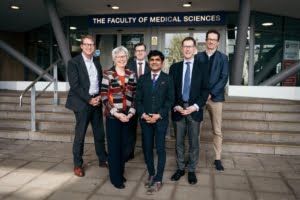We recently enjoyed Lister Fellowship Lectures from two of the 2022 cohort and a rather overdue one from 2020 Fellow, Dr Rebecca Lawson. These talks also coincided with some exciting news that we’re pleased to share here.
Lectures from 2022 winners, Dr Shoba Amarnath and Dr Anthony Khawaja

Back in April, our Director, Sally Burtles and our Chair, Professor John Iredale, travelled to the University of Newcastle to attend Dr Shoba Amarnath’s Fellowship Lecture.
Just a few days later, we were delighted to read Shoba’s newly published paper in PNAS, which was supported by her Fellowship: “Programmed cell death-1 receptor mediated regulation of Tbet+ NK1.1– Innate Lymphoid Cells within the Tumor Microenvironment.”
Shoba looks at why checkpoint therapy is not always a successful treatment for skin cancer. When it works – in about a third of cases – patients exhibit high survival rates, but why is it less effective for the other 70% of people?
The new research identified a novel population of immune cell that resides in the tissue of both mice and humans. Shoba’s team demonstrated that this cell population is the first to respond to checkpoint inhibitor receptor drugs and is the key for driving anti-tumour immunity. Ultimately, a blood test could be used to predict the likely success of checkpoint therapy for individual patients – the higher the population of this new cell type, the better the response to therapy.
“It’s an exciting paper – and quite controversial. Not only have we discovered a new subtype of tissue resident immune cell, but we’re also saying that this is the one to look at in cancer because it could well be driving the rest of the adaptive immune response.”

Earlier this month, Sally and John also paid a visit to the Institute of Opthalmology to see Dr Anthony Khawaja give his talk, titled “Genomics enabling personalised glaucoma care.”
You can watch a recording of the lecture here.
Anthony seeks to identify many new genetic markers of glaucoma and to build prediction tools that will enable population screening for early detection and more personalised glaucoma care.
John seized the opportunity to tell the packed lecture theatre about the transformational effects of the Lister Fellowship.
Check out Anthony’s publications on his Iris profile and read more about Shoba’s work on her personal website.
Finally – a Fellowship Lecture from our 2020 Prize Winner, Dr Rebecca Lawson!

Dr Rebecca Lawson won her Fellowship at a difficult time, back in 2020. For this and a host of other reasons, we have been unable to visit her in Cambridge until this April. Sally and Professor Sir Alex Markham – as the Chair when Rebecca received her Fellowship – attended to hear Rebecca speak about her research and to formally present her with her award.
We were especially excited to learn that based on the work funded by the Lister Institute, Rebecca has generated data that enabled her to successfully apply for a Wellcome Trust Mental Health Award.
Through awarding more than £47 million to 12 research teams, Wellcome is aiming to develop deeper knowledge on what makes interventions for anxiety, depression and psychosis effective.
Rebecca’s project, “Certain about uncertainty: bridging cells and the clinic to uncover causal mechanisms of anxiety interventions,” will use computerised tasks to capture an individual’s ‘uncertainty fingerprint’ – a measure of how people process different kinds of uncertainty in different cognitive contexts. Rebecca and her team will test whether medication and cognitive behavioural therapy work by improving tolerance of uncertainty.
Rebecca said on Twitter: “Delighted to be leading on one of these Wellcome Mental Health Awards with a dream team of co-investigators… An ambitious project bridging across scales and species – cannot wait to get started!”
It is incredibly rewarding to see the Lister funds leveraged with such success.
Find out more about Rebecca’s work on her lab’s website.



